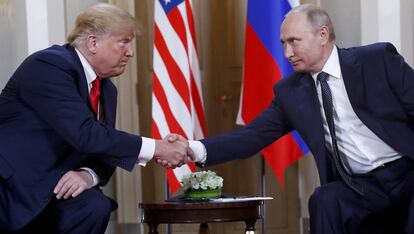Donald Trump and Vladimir Putin during a meeting in Helsinki in 2018. Pablo Martinez Monsivais
Joe Biden's handling of the Ukrainian crisis has drawn criticism from the ranks of the Republican Party.
Until then, all normal.
What is exceptional is what that unity in criticizing the adversary says about the division at home.
On the one hand, there are those who attack the sanctions, the first in a series that Washington is preparing to persuade Russian President Vladimir Putin: they are too soft and come too late.
On the other hand, there are the champions of
America First
, heirs to the isolationist rhetoric of Donald Trump, who believe that the United States would do better to focus on solving its internal problems before embarking on another foreign adventure, after two decades of endless wars in Afghanistan, Iraq and other countries that the average voter has difficulty locating on the map.
More information
Russia and Ukraine: latest news live
And then there is Trump himself, who, in a radio interview with a small conservative outlet, defined as "genius" that Putin declared a large part of Ukraine "independent" on Monday.
He called the move to subsequently send "a peacekeeping force" to Ukraine's southeastern breakaway territories "wonderful" and "clever." "We could use [that strategy] on our southern border [with Mexico]," he added.
"With us [in the White House], this would not be happening."
This Wednesday, Trump has abounded in his message with a statement in which he assures that "Putin is using Biden as a drum."
"And it's not a pretty sight to behold."
The divergence in foreign policy is not new in the conservative ranks;
It comes at least from the times of Bush Jr. and the
hawks
and
doves
of his Administration, and it already came to light in August, on the occasion of the chaotic withdrawal from Afghanistan.
But it goes beyond that, to the point of serving as a symptom of a battle for the soul of Abraham Lincoln's party that is being waged with an eye toward 2024, the year of the presidential election.
In that war, which has a first skirmish in November of this year, when the party will try to regain control of both chambers, Trump is the agent provocateur, who also showed public harmony with Putin in the White House during his four years of mandate, on which he planned the Russian intervention in the 2016 elections that gave him victory.
The two Republican representatives who participate in the committee investigating the attack on the Capitol on January 6 in the House of Representatives, black beasts of Trumpism, openly criticized the former president's statements.
Liz Cheney (Wyoming) did it on Twitter: “[Those words] help our enemies.
Trump's interests do not appear to align with those of the United States."
Adam Kinzinger (Illinois), for his part, deplored on the same social network a message from the account of the Republican representatives in Congress in which Biden is seen with his back turned, leaving the room where he gave the speech on Tuesday in which He acknowledged that the invasion of Ukraine had begun and detailed the "first battery of sanctions."
It was accompanied by a message (“this is what weakness looks like on the international board”) that angered Kinzinger.
Congressman from Illinois, although he does not plan to run again, he condemned that "fucking horrible tweet during this crisis."
"You can criticize the [foreign] policy, but this is crazy and feeds the Putin narrative."
As still “technically” a member of house Republicans, let me, with all my might, condemn this damn awful tweet during this crisis.
You can criticize policy but this is insane and feeds into Putin's narrative.
But hey, retweets amirite?
https://t.co/1b22DGMENl
— Adam Kinzinger (@AdamKinzinger) February 22, 2022
The aforementioned account also posted a statement signed by the leader of the Republican minority in Congress, Kevin McCarthy (California) and five co-religionists in which they bet on toughening the response to Putin: “China and North Korea are watching.
We must react firmly to this Russian aggression,” the note said.
“And sadly, Biden has always gone for appeasement,” McCarthy wrote on Tuesday.
The day before, eight Republican lawmakers along with 12 Democrats called for unity and pledged to "support any supplemental legislation" that would help "dictator Putin and his corrupt oligarchs pay a devastating price."
The most famous of the conservative lot, Senator Lindsey Graham (South Carolina), has since hardened his message by considering the sanctions announced by Biden as “inappropriate”.
🚨🚨🚨MUST READ🚨🚨🚨
House Republican Leadership's Statement on Russia's Invasion of Ukraine: pic.twitter.com/T3MiOEAqAt
— House Republicans (@HouseGOP) February 22, 2022
A similar path has been taken by the Republican leader in the Senate, Mitch McConnell (Kentucky): he went in one day from offering advice without too much criticism to blaming the accumulation of "almost 200,000 soldiers" ordered by the Kremlin on the management of the Biden Administration in Afghanistan, which offered an image of "weakness".
The other school of thought within the party has been embodied better than anyone by Paul Gossar, a congressman from Arizona who released an animated video in the fall in which he killed Democrat Alexandria Ocasio-Cortez.
“We should call ourselves Ukraine and then maybe NATO will commit to protecting our [southern] border,” he said this weekend.
Subscribe here to the EL PAÍS América
newsletter
and receive all the key information on current affairs in the region

